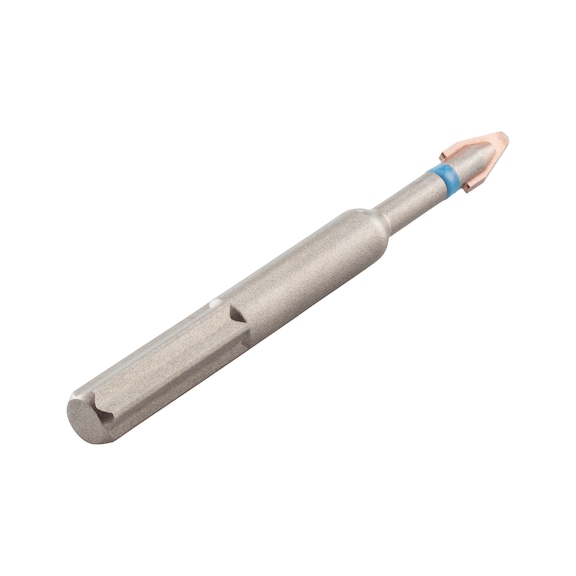For detailed information, other images and documents, please select individual articles from the following table.
Stoneware drill polygon shaft
The ideal solution, even for extremely hard stoneware tiles up to Mohs/scratch hardness 9, as well as glass and porcelain
Register now and access more than 20,000 products


Variants
Register now and access more than 20,000 products
Specially designed carbide plate geometry (multi-surface precision grinding)
- Precise drilling
- Precise, chip-free drilling
New polygon shank
- No slippage in the drill chuck
- Optimal torque transmission
Drill depth indicator
The coloured ring indicates the ideal drilling depth
No cooling required
Dry drilling
- Max. Speed: Diameter 5 mm (800 rpm), diameter 6 and 8 mm (600 rpm), diameter 10 and 12 mm (400 rpm), diameter 14 mm (200 rpm)
- Not suitable for impact drilling. For rotary drilling only!
- Optimum contact pressure: 35–45 kg
- If the recommended drilling speed is observed and the optimum contact pressure applied, but you can no longer hear a scraping sound, the drill bit has reached the end of its service life.
- Avoid placing high contact pressure on the drill bit when it is not rotating → Risk of breakage!
- Contact pressure too low and/or drilling speed too high → Service life ends prematurely!
- Avoid tilting and swivelling movements during the drilling process → Risk of breakage!
- We recommend drilling test holes (ideally in waste material from the tiles to be drilled)
- If the 14-mm diameter drill bit is used, pre-drilling must be carried out with an additional drill bit (8 mm).
Rotary drilling in porcelain stoneware tiles, tiles, glass (not safety glass) and porcelain. Ideal for electric and cordless drills.
1. Start the hole with point precision, applying light pressure
2. Switch on the drill
3. Apply full contact pressure → Scraping sound must be heard
4. Use reduced contact pressure once the tile has been fully penetrated
Select RAL-colour code
!! NOTE: On-screen visualisation of the colour differs from real colour shade!!










